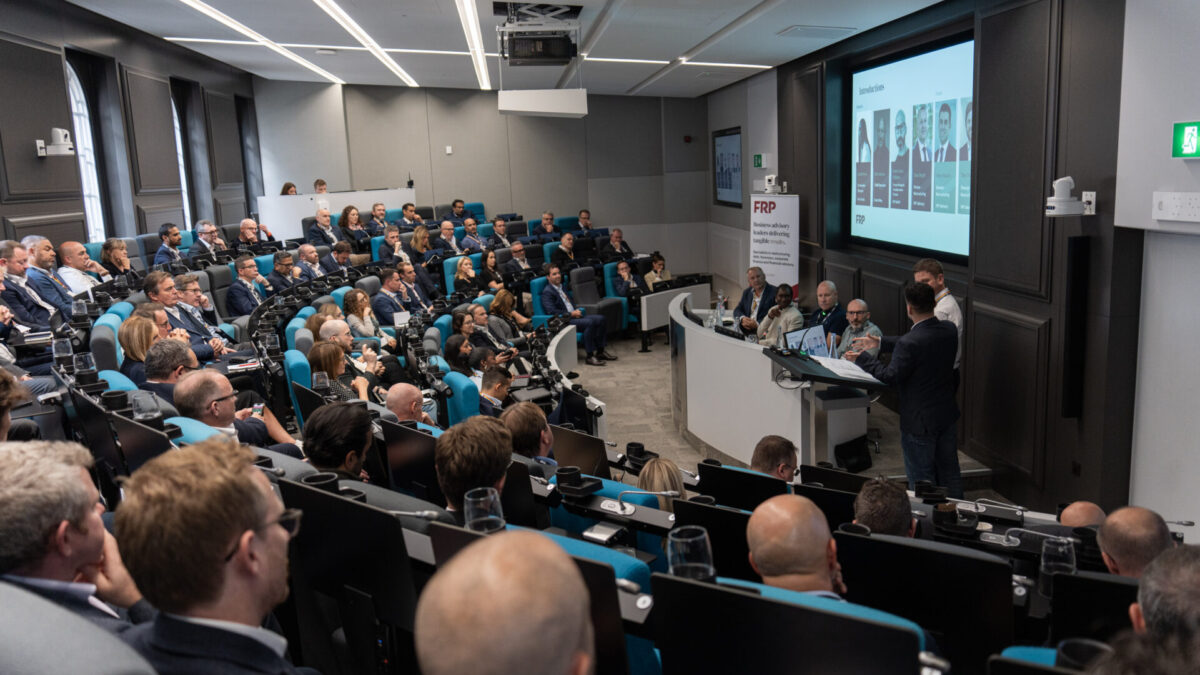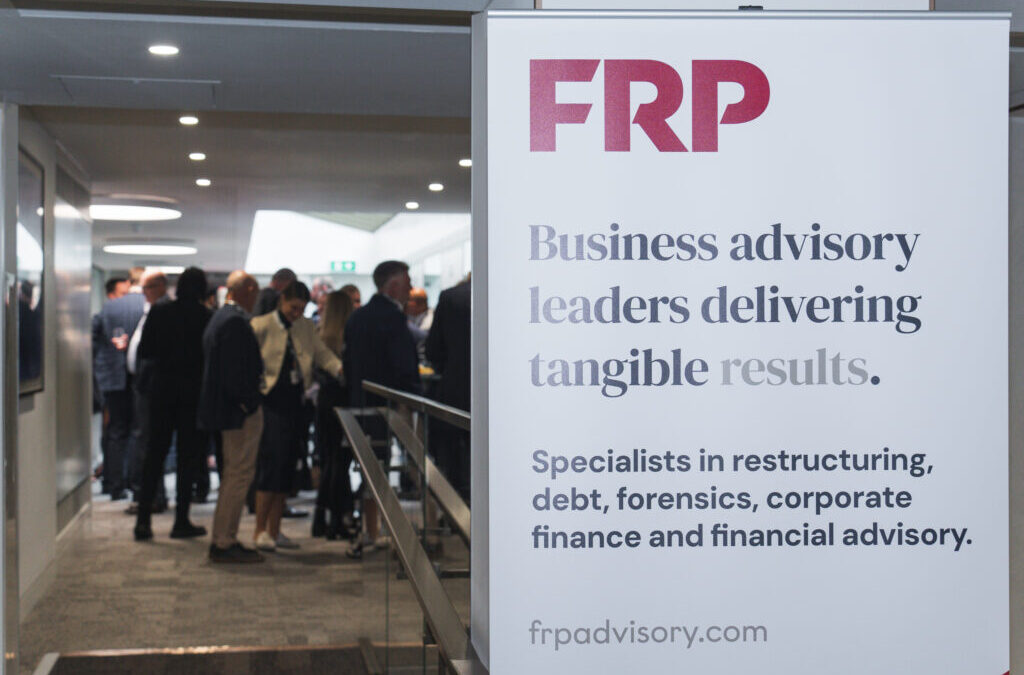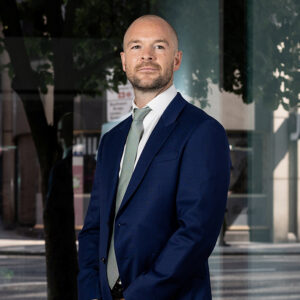FRP’s inaugural retail conference proved to be a dynamic and insightful event, tackling both the current challenges and emerging opportunities within the industry.
Navigating the Future of Retail
FRP’s inaugural retail conference proved to be a dynamic and insightful event, tackling both the current challenges and emerging opportunities within the industry. Chaired by Steven Cook, former CEO of Debenhams, he set the scene by highlighting the evolving landscape, driven by disruptive market forces, shifting consumer behaviour, and a particularly challenging economic backdrop.
Steven explained that despite the headwinds, there is still space to grow and thrive, emphasising this is a pivotal moment – which he called the “beginning of a retail renaissance” – encouraging attendees to act now, leveraging the right people, products, channels, and partnerships to minimize risks and maximize growth potential.
Lisa Byfield-Green, Director at Shrinking Globe and former Research Director at Retail Week, delivered the keynote, offering a high-level overview of what lies ahead for the industry. With a focus on consumer sentiment and economic projections, she highlighted the “escape mentality” dominating consumer behaviour, where experiences like travel thrive while the purchasing of material ‘things’ faces polarisation.
She also noted a clear divide, with wealthier consumers less affected by inflation, while others feel the weight of the cost-of-living crisis, driving the need for brands to inspire consumers to part with their cash. Lisa explained that retailers must understand their segmented audiences and cater accordingly – citing Vinted as a success story amidst challenging economic conditions.
Looking ahead, Lisa shared cautious optimism for 2025. While global disruptions continue, growth in emerging markets, coupled with retailers embracing technology and AI, offer a glimmer of hope and light at the end of the tunnel. Those that focus on understanding their brand identity and using digital tools to enhance personalisation and customer engagement are likely to emerge stronger.


Retail and recovery: A guide to lending in the sector’
Our expert panel including Addleshaw Goddard Partners, Mike Davison and James Tartelon alongside Director at European Valuations Dan Edgar and FRP’s Dave Edwards – with FRP Chair Alastair Massey – provided essential insights into retail lending, current market trends and recovery themes.
This workshop provided a comprehensive look into the evolving landscape of retail lending, valuation, and market dynamics. Panellists highlighted the importance of securing IP within borrower structures to support enforcement and exits.
Flexibility in ABL structures was stressed as particularly advantageous for retail, especially for managing seasonal business cycles and cash flows. Discussions on retail valuation focused on net order and liquidation value, emphasising that these processes are dynamic and vary by case. Retail, with its lower customer concentration and predictable cash flows, offers more stable lending opportunities compared to wholesale. While lenders’ credit appetite varies, ABL typically spans multiple asset classes like accounts receivable and equipment, creating flexibility in lending.
Also addressed was the predictability of demand in retail, with the experts noting how data-driven insights from sales and discounts can enhance accuracy in valuation. Effective governance and technology systems were recommended to help retailers streamline diverse inventory and locations, while automated borrowing bases simplify financing tasks. The importance of aligning with suppliers, managing inventory lending, and working closely with HMRC to keep businesses trading were also highlighted as key to navigating the complexities of retail lending.
The workshop offered actionable insights into the changing face of retail finance, providing lenders and retailers with strategies to adapt to market dynamics, leverage asset-based lending, and maximize value in an ever-evolving sector.
‘Realities of retail: Examining fraud risk management’
FRP’s Molly Sandquest and Jonathan Wheatcroft alongside Senior Associate of global law firm DLA Piper, Harriet Campbell led the discussion on fraud risk management in retail.
They examined the new offence of ‘failure to prevent fraud’ under this, an organisation will be liable where fraud is committed for the benefit of an organisation (directly or indirectly) by an associated person acting for or on behalf of the business. The penalties can only be mitigated if the organisation has ‘reasonable’ fraud prevention procedures in place. Crucially, the leadership of the company does not need to have orchestrated, or even to have known about, the fraud for it to be held liable.
As such, counter-fraud controls are now just as much about protection as prevention. Panellists also delved into the psychology of fraud and the structure of an effective counter-fraud programme.
Panel Discussion: In conversation with the FRP retail team
The day closed with FRP experts examining their landmark retail cases – BHS, Clintons, Debenhams, and The Body Shop – and how these cases continue to shape the future of the sector. From the challenges of restructuring to the importance of brand identity and cashflow management, the message was clear – retail is in the midst of a profound transformation, and those who adapt will not only survive but thrive.
As the session drew to a close, there was a sense of cautious optimism. While the challenges are real, the opportunities are as significant. Businesses that take bold, calculated steps now will be the ones to define the future of the industry.
The conference provided not just a forum for ideas but a blueprint for action. With the right strategy, partnerships, and an unwavering focus on the customer, great things are in store for the sector.
Key Takeaways:
- Retail Renaissance: Now is the time to act, with opportunities for growth despite challenges.
- Cautious Optimism for 2025: Global disruptions remain, but emerging markets and AI investments offer significant hope.
- Consumer Segmentation is Key: Understanding diverse consumer needs will be critical to success.
- Financial Fundamentals: Effective cashflow and value assessment strategies are essential in today’s volatile market.
- Adaptability & Innovation: Retail must continue to evolve, with technology and personalised experiences leading the way.
- Early engagement is the key: Engaging with advisers early and seeking advice is crucial to businesses to navigate existing challenges
The insights gained from this week’s conference emphasised that there has never before been a more critical time to be proactive, innovative, and resilient.





















